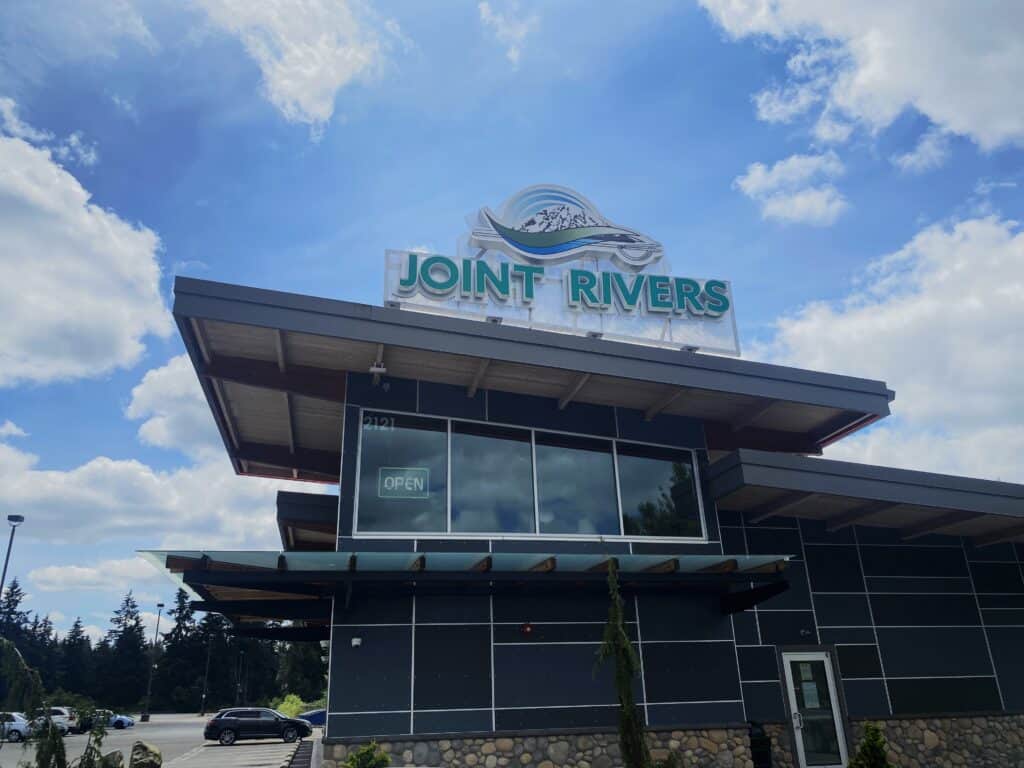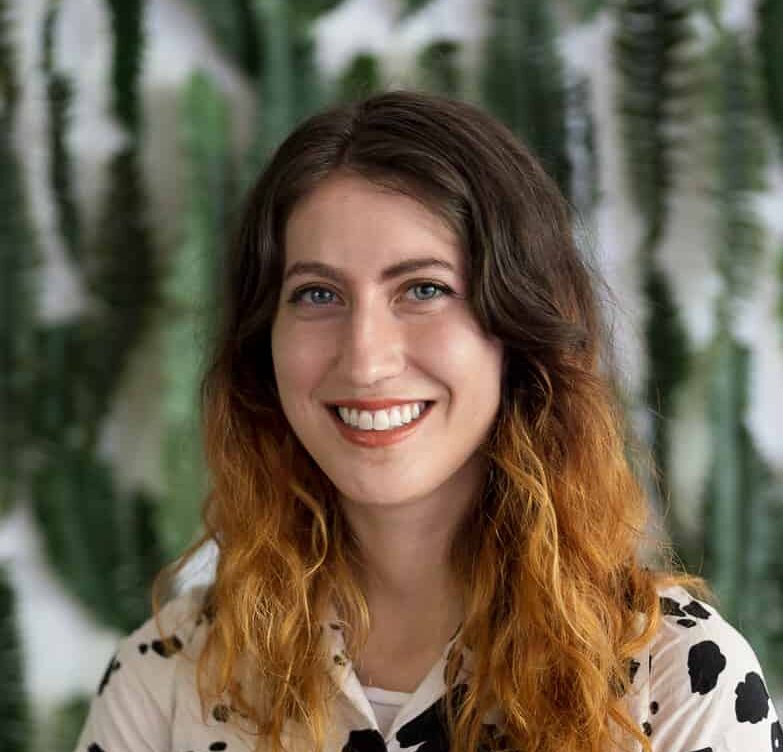The Pacific Northwest is a gem of a region with its many coastlines, expansive forests, and rolling mountain ranges. It’s also the place that Indigenous tribes called home long before colonization, where they stewarded the land, lived out their traditions, and co-existed with nature.
Washington state is home to twenty-nine federally-recognized tribes (though many more exist without the government’s “recognition”). Since recreational cannabis legalization rolled out in the 2010s, several of these tribes have been able to sign state-tribal marijuana compacts, allowing them to produce, process, purchase, and sell cannabis on tribal land. The region’s tribes have been hit hard by generations of trauma, and the money brought in from operating cannabis businesses provides an excellent opportunity to reinvest funds back into their communities.
Though similarities may exist across tribes, each individual community has its own history, culture, and traditions. So naturally, these tribal cannabis dispensaries all operate a little differently. With so many opportunities to support Indigenous cannabis right here in Washington, I decided to take a trip to three local dispensaries, each owned by a different tribe across the Lushootseed territories.
The Remedy – Tulalip
The first stop on my little dispensary tour was The Remedy, a cozy dispensary that sits on Tulalip land, just off of Interstate 5.
Established in 1855 following the Treaty of Point Elliott, the Tulalip Indian Reservation spans more than 22,000 acres. The Remedy is adjacent to the Tulalip Resort Casino, a lucrative position for a cannabis dispensary looking to draw crowds.
And that’s exactly what it’s doing. After parking in the spacious lot out front, I watched as people of all ages entered the store alongside me, where I was surprised to only wait in line for a minute or two. The store was busy when I arrived on a Saturday afternoon, but the counters were staffed with several budtenders, a mix of tribal and general public, who tended to their customers quickly and efficiently.
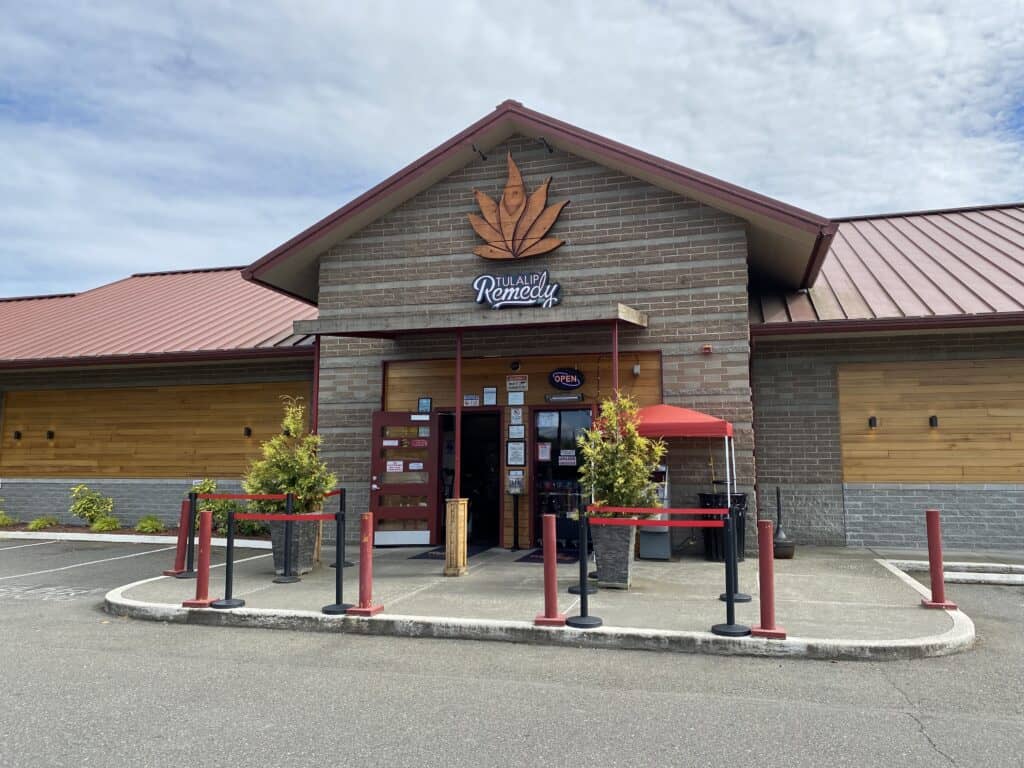
Tribal council has chosen to prohibit cell phones inside the store, so I wasn’t able to capture the interior, but it had a very comfortable feel to it, with plenty of products and accessories to look at in the display cases, as well as a movie playing on one of the big screens along the wall. I spoke to a budtender who informed me that, while he’s not a member of the Tulalip Tribe, he feels lucky to work at The Remedy, and boasts that it “has the best benefits around.” He shared that the store hires on a tiered system, with Tulalip tribal members at top priority, followed by members of any local tribes, then spouses of tribal members, and finally, those who have worked with the tribe in the past, before the last tier: the general public.
The Remedy serves cannabis users from all walks of life. The staff shared that the morning tends to bring in the older crowd, while the evening lends to a lot of young, working people. They weren’t able to identify a category that sells best, informing me that it’s really dependent on their sales discounts for tribal members.
I then spoke with Charlita Davis, a member of the Tulalip Tribe and staff at The Remedy. “The dispensary has helped a lot of people cut back on opiate use. It seems like there is less heroin and meth use since we got the dispensary,” she said, adding that “The money goes back to all of us members and it’s really helped us upgrade some of our things out here.”
When it came time to actually buy some bud, I went with the budtender’s choice: one Znapple pre-roll and one After Chem pre-roll, both by Fireline Cannabis. The picks did not disappoint.
Joint Rivers – Muckleshoot
Next on my tour was Joint Rivers, the dispensary owned and operated by the Muckleshoot Tribe. Though the tribe’s traditional territory spanned along the Green and White rivers and into the Cascade Mountains, the post-treaty Muckleshoot land has been in Auburn, Washington since 1857.
As I turned into the Muckleshoot complex parking lot, the Joint Rivers immediately caught my eye: The shop is large, tall, and boasts big green lettering. Inside, the line was short, likely due to it being Sunday afternoon, though my budtender, Love Toral, told me that they get most of their traffic in the early morning or evening. “A lot of people still don’t even want their car to be seen here,” she added, alluding to the negative associations many tribal members still have about weed.
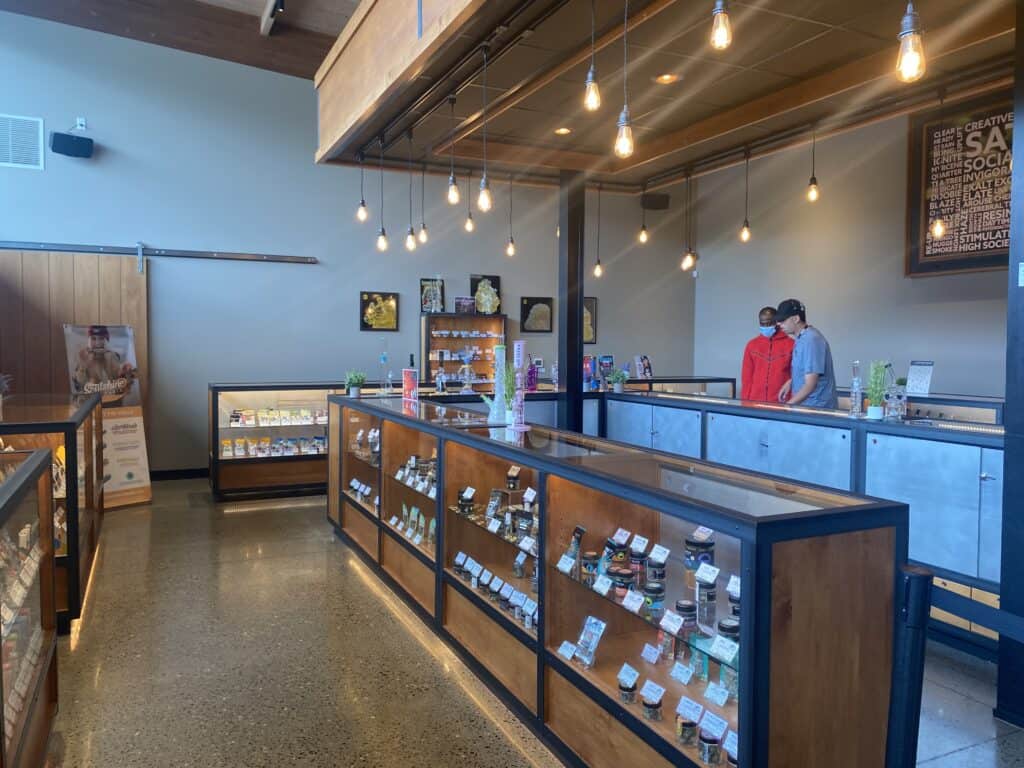
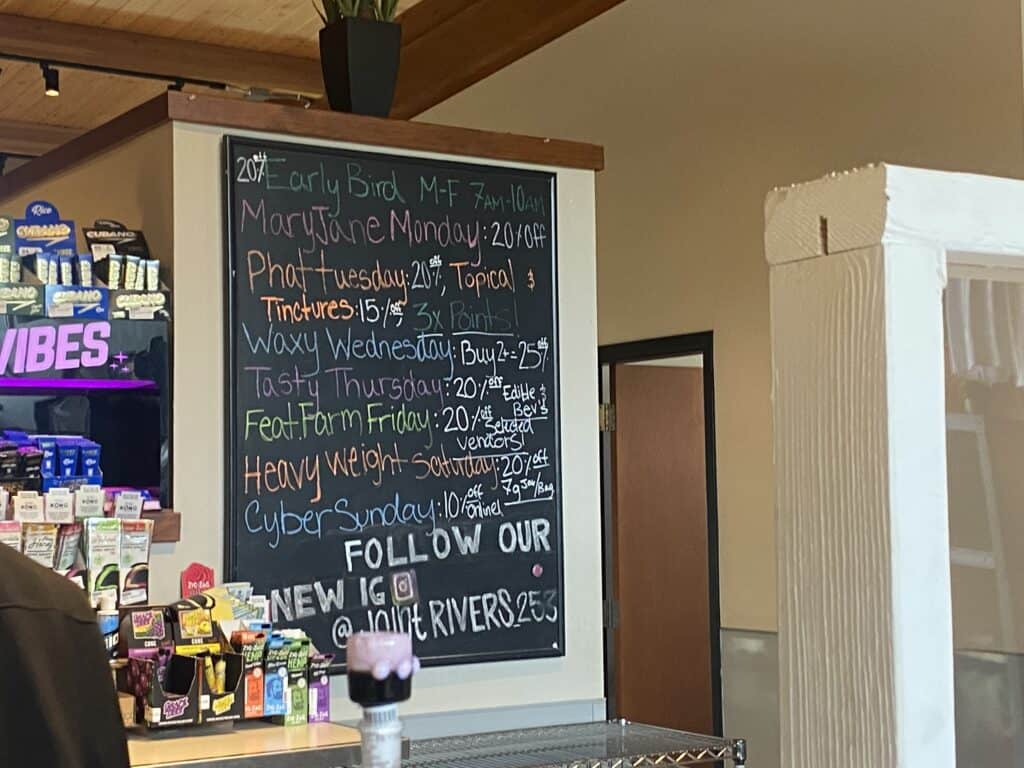
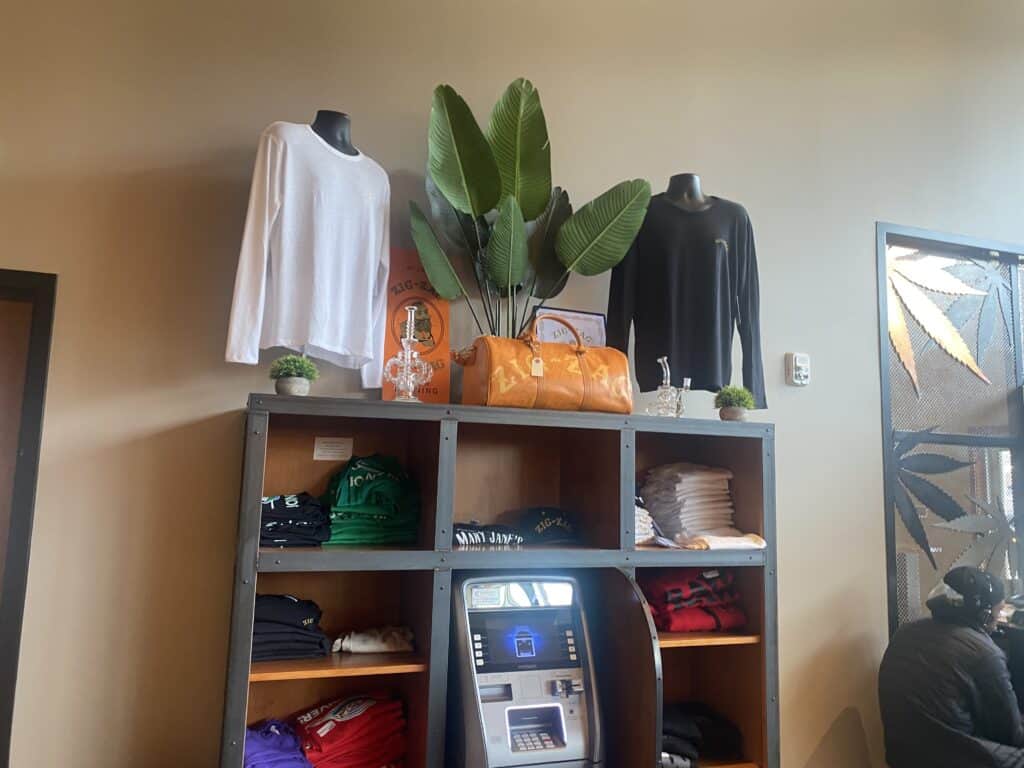
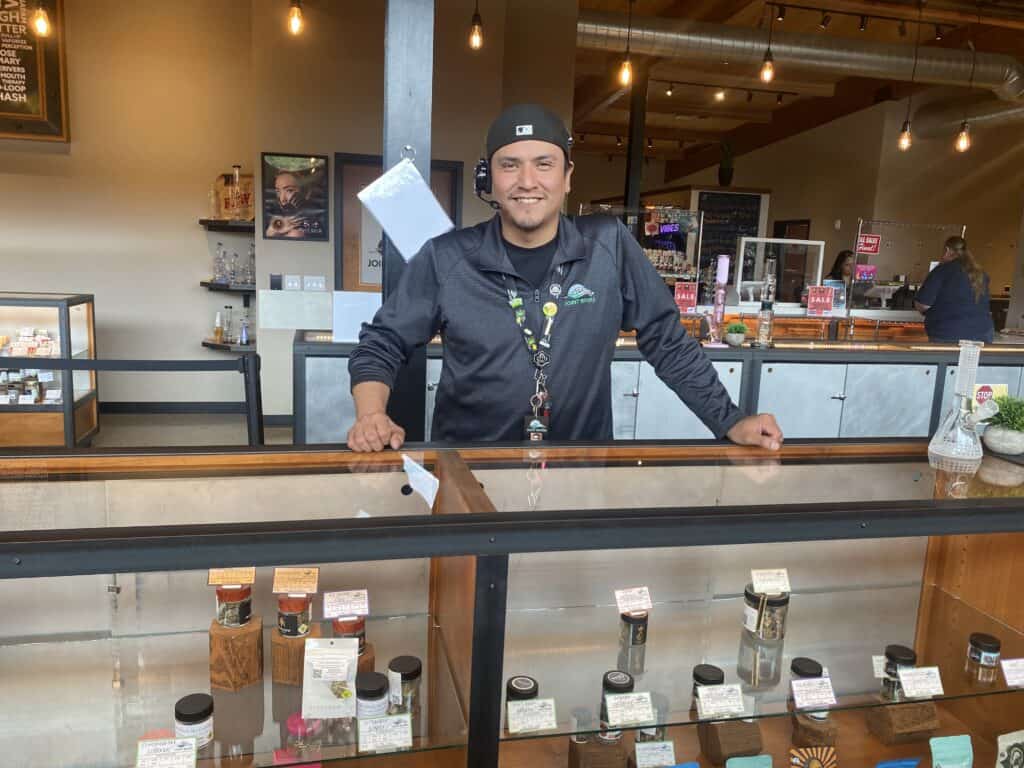
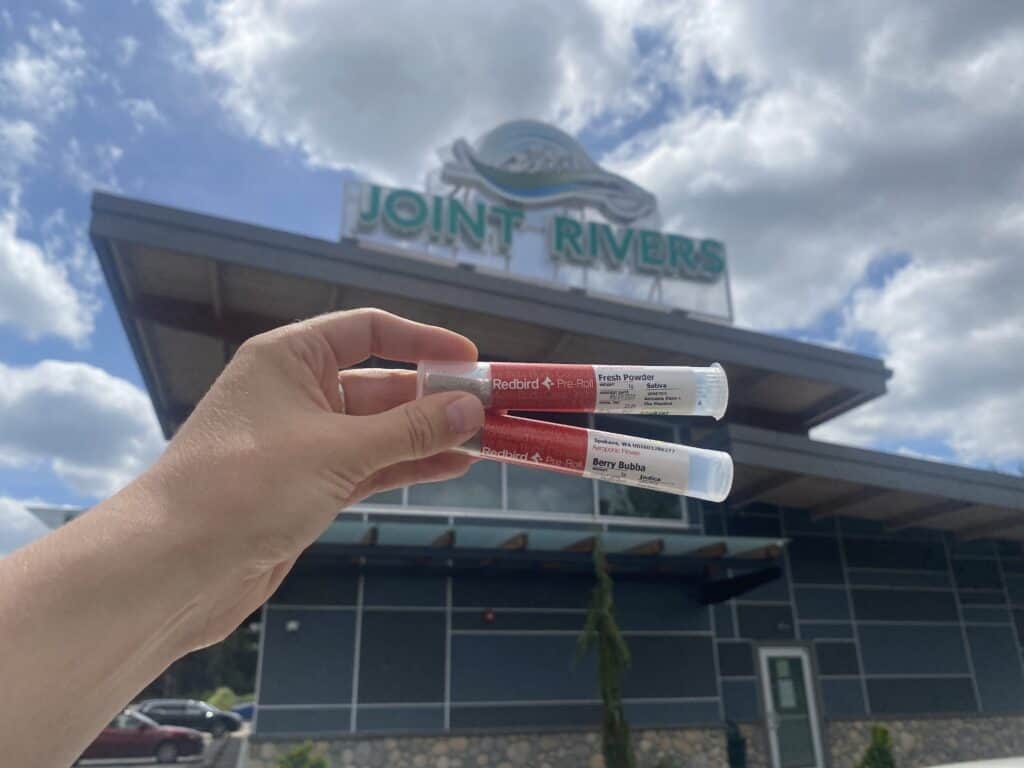
Love told me that the biggest category they sell is pre-rolls, by far. After that, she said cartridges fly off of the shelves because they are discreet. “People don’t always like to be seen smoking a joint around here,” she added. Additionally, they sell a lot of CBD at their dispensary, something Love attributes to many people seeking some form of relief rather than a high.
The dispensary is well-organized, with all products organized alphabetically, rather than by price. All of the sections are color-coordinated as well, indicating whether products are indica, sativa, or hybrid. A large Zig Zag duffle bag sits on display near the entry on top of a large wood shelf filled with shirts and other Joint Rivers merch. The display cases are also made with wood, adding to the cozy environment inside the store. Joint Rivers employs around thirty-three people, with priority to Muckleshoot tribal members, followed by people from other tribes.
During fireworks season, Love says the store’s traffic skyrockets as fireworks shoppers stop by to stock up. She also says the store brings in a lot of traffic from people stopping in during breaks at bingo, which is located just across the parking lot. Joint Rivers offers discounts for all tribal members, and allows them to double-discount with whatever the store’s special deals are each day.
The benefits Joint Rivers has provided are plentiful. “A lot of people have cut back on drug use,” Love says, adding, “I wish everybody would switch to 420.” She explains that it’s not just people cutting back on hard drugs or pharmaceuticals who turn to cannabis,. “It’s people with body aches, anxiety tremors, and other health reasons.”
On Love’s recommendation, I left with two pre-rolls by RedBird cannabis, Berry Bubba and her personal favorite, Fresh Powder.
Commencement Bay Cannabis – Puyallup
I wasn’t kidding when I said each dispensary operates differently. Commencement Bay Cannabis was the last stop on my trip, and it was vastly different from the previous two. I visited the flagship location (they’ve branched out to four locations all on Puyallup tribal land), and it was bustling, far from the smaller, more intimate feel that both the Muckleshoot and Tulalip dispensaries provided.
The word Puyallup can be literally translated into “people from the bend at the bottom of the river.” There’s no doubt that these people have benefitted from owning and operating a fruitful business on their land, growing from one location to four and even bringing Cheech and Chong out to celebrate the opening of their second location back in 2019.
Despite how busy it was, the flagship location offers plenty of space and a large selection of products to choose from. It also has a nice selection of art around the shop, with gorgeous drums along the walls and cultural pieces on display.
The store’s top seller is flower, with pre-rolls as a close second. As with the other two locations, the budtenders told me that they get a lot of older people in the morning, followed by a younger, working crowd in the evening. But for a Sunday afternoon, I was surprised at how many people were shopping with me, ranging from people in their early twenties to tribal elders. Members of the Puyallup Tribe get 20% off all products.
An interesting note about the Commencement Bay Cannabis location I visited is that none of the working staff of about ten were Puyallup, except for one person. I spoke with him, but in the interest of privacy, I am not using his name. He said there are incentives to hire members of the tribe, but they just didn’t have many working that day.
He went on to tell me that the dispensary has been really good for the tribe, particularly during the pandemic when it was difficult to keep everything else afloat. He echoed Love Toral in saying that the dispensary has provided a good pathway for some people to decrease their opiate use.
“Everyone of any legal age smokes weed,” one budtender told me, explaining that they sell to a huge range of clientele. She said that Torus pre-rolls fly off the shelves, so I had to get myself a pack of their Peanut Sundae joints. She also recommended Purple Crouching Tiger by Secret Gardens, so naturally I left with both.
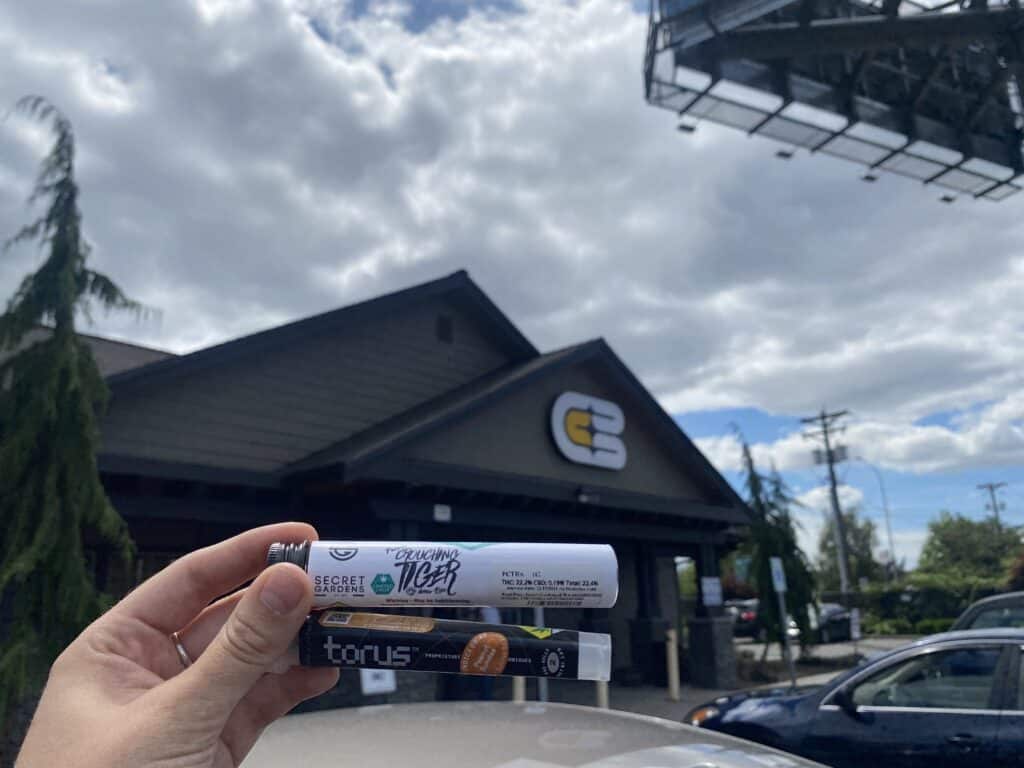
I didn’t get to visit all of the native-owned dispensaries in my home state, but I am planning to hit the rest soon. Each of the three I visited had a unique twist on what it means to own and operate a dispensary on sovereign land, but with the same key takeaways: it’s a positive, beneficial operation for their people. It goes beyond that, though, providing value for the larger community who rely on these tribal-owned dispensaries to provide their plant medicine and recreation, regardless of their heritage.
Needless to say, Indigenous cannabis businesses cannot be boiled down to one type, as there are so many ways for tribes to operate and provide for their people and the larger community. We’re excited to continue reporting on Indigenous cannabis as more tribes enter the industry.


